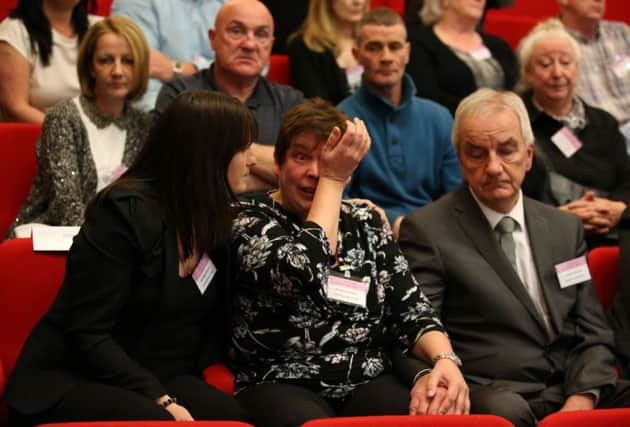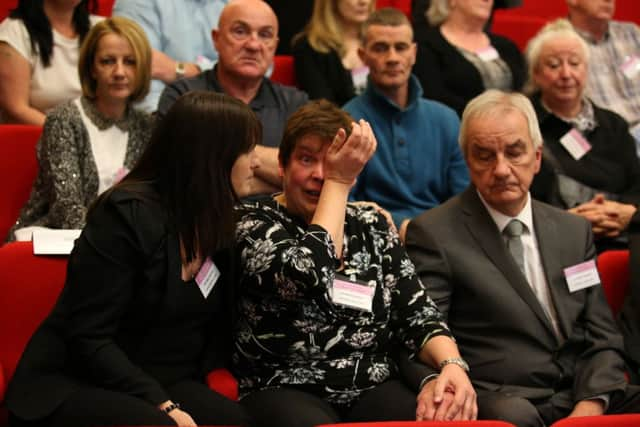NHS failures blamed for C.diff at Vale of Leven


The five-year investigation into the outbreak at the Vale of Leven Hospital in West Dunbartonshire found NHS Greater Glasgow & Clyde (GGC) had “badly let down” patients, with “totally unacceptable” delays in treatment and “governance and management failures”.
Although the inquiry’s chairman, Lord MacLean, reserved the worst criticism for the health board, he said the Scottish Government had also failed to put in place a rigorous inspection regime that could have identified the “dysfunctional” practices at the hospital.
Advertisement
Hide AdAdvertisement
Hide AdHe said that although C.diff was a causal factor in the death of 34 patients between 1 January, 2007 and 31 December the following year, it was “probable” that the toll of fatalities was an “underestimate” given medical records were not available for all the 143 patients who tested positive for the bacterial infection.


Lord MacLean cited poor facilities, such as a lack of wash hand basins and a lack of commodes, as well as issues with the fabric of the building as evidence of poor management.
The judge said the prolonged uncertainty over the future of the Vale of Leven hospital, which faced the removal of key services, also contributed to poor morale among staff and recruitment. Poor leadership among NHS GGC managers, the judge said, contributed to substandard nursing care and deficiencies in medical staffing there.
In the wake of the report, the health board issued a “full and unreserved apology” and stressed such an outbreak “could not happen again” due to an overhaul of clinical practice.
Shona Robison, the newly appointed health secretary, also apologised to those affected and said she had called on all health board across the country to review their services following Lord MacLean’s recommendations.
While the affected families praised the “complex and detailed” report, they emphasised that they would not be “deflected or palmed off” in their “resolute determination” to see every recommendation implemented.
CONNECT WITH THE SCOTSMAN
• Subscribe to our daily newsletter (requires registration) and get the latest news, sport and business headlines delivered to your inbox every morning
The final 439-page report of the £10.3 million inquiry makes 75 recommendations designed to bring about a “significantly improved focus on patient care” according to Lord MacLean. They focus on areas including infection prevention and control, nursing and medical care, and antibiotic prescribing.
Advertisement
Hide AdAdvertisement
Hide AdA C.diff infection is a type of bacterial infection that can affect the digestive system and can lead to life-threatening complications such as severe swelling of the bowel from a build-up of gas. It most commonly affects people who have been treated with antibiotics.
Outlining the summary of his report yesterday at the Royal College of Physicians and Surgeons in Glasgow, Lord MacLean said: “The inquiry has discovered serious personal and systemic failures. Patients at the Vale of Leven Hospital were badly let down by people at different levels of NHS Greater Glasgow & Clyde who were supposed to care for them.
“There were failures by individuals but the overall responsibility has to rest with the health board. The Scottish ministers bear ultimate responsibility for NHS Scotland and, even at the level of the Scottish Government, systems were simply not adequate to tackle effectively a healthcare-associated infection like C.diff.
“The major lesson to be learned is that what happened at Vale of Leven Hospital to cause such personal suffering should never be allowed to happen again.”
Andrew Robertson, chairman of NHS Greater Glasgow & Clyde, said: “On behalf of the board and our staff, I would like to offer a full and unreserved apology to the patients affected and to the families who lost a relative to C.diff in the months between January 2007 and late 2008. This was a terrible failure and we profoundly regret it.
“I can give the firmest of assurances that, as a result of the lessons that have been learned, this could not happen again.”
The health board’s chief executive, Robert Calderwood, reiterated his personal apology and said he hoped the relatives “can take some comfort” from “significant improvements” in how it operates, such as more prudent prescribing of antibiotics.
“These major improvements introduced since the tragic events of six years ago have made the Vale and all of our hospitals in Greater Glasgow and Clyde safer for patients than they have ever been,” he said.
Advertisement
Hide AdAdvertisement
Hide AdMs Robison also apologised to the patients and their relatives, saying she was “truly sorry” they had been “let down by our NHS”.
She said: “Our NHS failed in its duty of care for all of these patients and their families. That is why we will accept all 75 recommendations and go further where we can.
“As well as creating our implementation group, I am today writing to all health boards to ensure they review their services against the report and respond to the government within eight weeks.”
Ms Robison said Lord MacLean’s report offered a “thorough, definitive and clear explanation” of a catalogue of errors and said that while the health service as a whole had “moved on significantly” in the seven years since the outbreak, its findings provide “further insight” to prevent any repeat.
She explained: “This report indicates a clear picture of the failings in the system that led to the C.diff outbreak. Its findings outline the lack of investment in the hospital, which was simply no longer fit for its purpose of providing modern health care. There was a lack of managerial oversight and a fundamental breakdown in the links between what was happening at ward level and those in positions of authority at the board.”
The “bad practice” and lack of managerial control at the health board, she went on, stemmed from uncertainty surrounding the merger of the former NHS Argyll & Clyde board with NHS Greater Glasgow. First announced in 2005, it was not effectively implemented until after the outbreak.
Nonetheless, she called on the health board to consider the criticism in Lord MacLean’s report “urgently”, explaining: “The report highlights those who either abdicated their responsibilities or failed to carry them out effectively. There is no place for this conduct in our NHS, which fell below even the minimum standards we expect.
“The report found clear failings across all levels in the system – including nursing and medicine through to management. Our top priority is that lessons are learned so that what happened at the Vale of Leven can never be allowed to happen again.”
Advertisement
Hide AdAdvertisement
Hide AdJackie Baillie, Labour’s health spokeswoman and Dumbarton MSP, said: “What happened at the Vale of Leven should never be repeated anywhere in Scotland so it is vital we learn lessons and implement MacLean’s recommendations in full.”
Jackson Carlaw for the Scottish Conservatives, said: “Failing after failing is set out here.”
Dr Charles Saunders of the British Medical Association’s Scottish public health committee, warned that some of the circumstances that “led to the challenges” at the hospital still exist in the NHS, such as staff shortages and rising workloads.
Theresa Fyffe, director of the Royal College of Nursing Scotland, said the inquiry report “shows what can happen when there are failings at all levels from the ward to the boardroom to national government.”
A full Scottish Government response to the report will be published next spring.
The findings
The inquiry chaired by Lord MacLean made 75 recommendations. They include:
• Health boards should ensure infection prevention and control is explicitly considered at all clinical governance committee meetings
• Health boards should ensure patients are informed by medical and nursing staff when there is a suspicion they have C.diff
Advertisement
Hide AdAdvertisement
Hide Ad• Nursing staff caring for patients with C.diff should keep accurate records of patient observations across all health board areas
• Where there is a risk of cross infection, the nurse in charge of a ward should have ultimate responsibility for patient admission
• Any changes in policy or guidance on antimicrobial practice issued by the Scottish Government should be implemented without delay
• Patients with suspected C.diff should receive a full clinical assessment by senior medical staff
• Health boards must ensure there is 24-hour cover for infection prevention and control seven days a week
• A national agency should be identified to undertake routine national monitoring of deaths related to C.diff
• The Scottish Government should ensure the Healthcare Environment Inspectorate has power to close a ward to new admissions if there is a real risk to patient safety
• The Scottish Government should develop local healthcare associated infection taskforces within each health board area.
Advertisement
Hide AdAdvertisement
Hide Ad• An agreed system of care planning must be in use in every ward with the appropriate documentation available to nursing staff.
• The nurse in charge of each ward must audit compliance with the duty to keep clear and contemporaneous patient records
• Health Boards should ensure that any discussion between a member of nursing staff and a relative about a patient which is relevant to the patient’s continuing care is recorded in the patient’s notes.
C.diff omitted from 7 death certificates
THE spate of C.diff infections and death at the Vale of Leven Hospital was the worst such outbreak in the UK.
The spread of the bacteria at the Alexandria hospital was widespread. In a facility with 136 beds in 2008, C.diff was a causal factor in the death of 34 patients.
The problem with the bacteria was not apparent until May 2008, even though a significant number of patients suffered from illness as far back as the previous January.
Indeed, between 1 January 2007 and the following June, there were 199 positive test results for C.diff from 131 patients, yet the bacteria was not mentioned on the death certificates of seven patients who died where it was an underlying cause or contributory factor. The extent of the infection only came to light following a local newspaper report in June 2008.
After the scandal broke, the five-year inquiry gathered evidence, often hearing harrowing accounts of conditions and practices at the hospital.
Advertisement
Hide AdAdvertisement
Hide AdRelatives told the inquiry of how elderly patients sat with dirty fingernails in the ward, with several family members recalling how they could smell faeces from their loved ones’ hands.
One relative told Lord MacLean’s team of her mother: “She wasn’t offered any way of washing her hands after she had used the commode, and I had given her hand wipes and hand gel for her own personal use, but underneath her fingernails you could see excrement.”
Another family member told of how her mother had been allowed to fall asleep with an egg in her mouth after a mealtime.
Nursing management, furthermore, were unaware of the extent of the problems with fundamental aspects of care, while across the health board, Lord MacLean’s investigation found that infection prevention and control were viewed as “low priority” by NHS Greater Glasgow & Clyde managers.
SEE ALSO:
SCOTSMAN TABLET AND IPHONE APPS